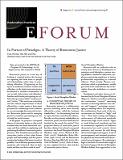| dc.contributor.author |
Ted Wachtel, President, International Institute for Restorative Practices, Bethlehem, Pennsylvania, USAPaul McCold, Department of Sociology and Criminal Justice, Old Dominion University, Norfolk, Virginia |
| dc.coverage.spatial |
EEUU |
| dc.date.accessioned |
2016-01-07T15:26:45Z |
| dc.date.available |
2016-01-07T15:26:45Z |
| dc.identifier.uri |
http://desa1.cejamericas.org:8080/handle/2015/2163 |
| dc.description.abstract |
Restorative justice is a new way of looking at criminal justice that focuses on repairing the harm done to people and relationships rather than on punishing offenders. Originating in the 1970s as mediation between victims and offenders, in the 1990s restorative justice broadened to include communities of care as well, with victims’ and offenders’ families and friends participating in collaborative processes called “conferences” and “circles.” This new focus on healing and the related empowerment of those affected by a crime seems to have great potential for enhancing social cohesion in our increasingly disconnected societies. Restorative justice and its emerging practices constitute a promising new area of study for social science.In this paper, we propose a conceptual theory of restorative justice so that social scientists may test these theoretical concepts and their validity in explaining and predicting the effects of restorative justice practices. The foundational postulate of restorative justice is that crime harms people and relationships and that justice requires the healing of the harm as much as possible. Out of this basic premise arise key questions: who is harmed, what are their needs and how can those needs be met? |
| dc.language.iso |
Inglés |
| dc.title |
In Pursuit of Paradigm: A Theory of Restorative Justice |
| dc.ceja.source |
Fuente: Paper presented at the XIII World Congress of Criminology, 10-15 August 2003, Rio de Janeiro. |

